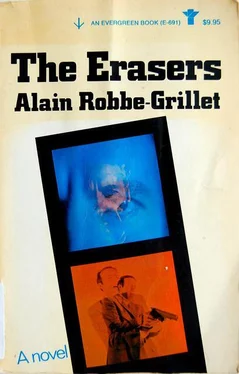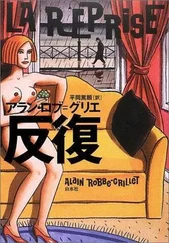Alain Robbe-Grillet - The Erasers
Здесь есть возможность читать онлайн «Alain Robbe-Grillet - The Erasers» весь текст электронной книги совершенно бесплатно (целиком полную версию без сокращений). В некоторых случаях можно слушать аудио, скачать через торрент в формате fb2 и присутствует краткое содержание. Жанр: Криминальный детектив, на английском языке. Описание произведения, (предисловие) а так же отзывы посетителей доступны на портале библиотеки ЛибКат.
- Название:The Erasers
- Автор:
- Жанр:
- Год:неизвестен
- ISBN:нет данных
- Рейтинг книги:4 / 5. Голосов: 1
-
Избранное:Добавить в избранное
- Отзывы:
-
Ваша оценка:
- 80
- 1
- 2
- 3
- 4
- 5
The Erasers: краткое содержание, описание и аннотация
Предлагаем к чтению аннотацию, описание, краткое содержание или предисловие (зависит от того, что написал сам автор книги «The Erasers»). Если вы не нашли необходимую информацию о книге — напишите в комментариях, мы постараемся отыскать её.
The Erasers — читать онлайн бесплатно полную книгу (весь текст) целиком
Ниже представлен текст книги, разбитый по страницам. Система сохранения места последней прочитанной страницы, позволяет с удобством читать онлайн бесплатно книгу «The Erasers», без необходимости каждый раз заново искать на чём Вы остановились. Поставьте закладку, и сможете в любой момент перейти на страницу, на которой закончили чтение.
Интервал:
Закладка:
The Erasers
Alain Robbe-Grillet
“Time that sees all has found you out against your will.”
- SophoclesPROLOGUE
1
In the dimness of the cafe, the manager is arranging the tables and chairs, the ashtrays, the siphons of soda water; it is six in the morning.
He has no need to see distinctly, he does not even know what he is doing. He is still asleep. Very ancient laws rule every detail of his gestures, saved for once from the uncertainty of human intentions; each second marks a pure movement: a side-step, the chair eleven inches out from the table, three wipes of the rag, half-turn to the right, two steps forward, each second marks, perfect, even, unblurred. Thirty-one. Thirty-two. Thirty-three. Thirty-four. Thirty-five. Thirty-six. Thirty-seven. Each second in its exact place.
Soon unfortunately time will no longer be master. Wrapped in their aura of doubt and error, this day’s events, however insignificant they may be, will in a few seconds begin their task, gradually encroaching upon the ideal order, cunningly introducing an occasional inversion, a discrepancy, a confusion, a warp, in order to accomplish their work: a day in early winter without plan, without direction, incomprehensible and monstrous. But it is still too early, the street door has just been unbolted, the only person on the scene has not yet recovered his own existence. It is the moment when the dozen chairs gently come down from the imitation marble tables where they have spent the night. Nothing else. An automaton’s arm puts the setting back in place.
When everything is ready, the light goes on…
A fat man is standing here, the manager, trying to get his bearings among the tables and chairs. Over the bar, the long mirror where a sick image floats, the manager, greenish, his features blurred, liverish and fleshy in his aquarium.
On the other side, behind the mirror, the manager again who dissolves slowly in the dawning light from the street. It is no doubt this silhouette that has just put the cafe in order; now it need only disappear. In the mirror flickers the reflection of this ghost, already almost completely decomposed; and beyond, increasingly undecided, the wavering rigmarole of shadows: the manager, the manager, the manager The manager, a mournful nebula, drowned in his halo.
Painfully the manager emerges. He fishes up again some random snatches that are still floating around him. No need to hurry, there’s not much current at this hour.
He leans on both arms against the table, body tilted forward, not wide awake, his eyes staring at something: that fool Antoine with his Swedish calisthenics every morning. And his pink tie the other day, yesterday. Today is Tuesday: Jeannette’s coming later.
Funny little spot; this marble’s no good, everything stains it. It looks like blood. Daniel Dupont last night; a stone’s throw from here. Funny business: a burglar would never have gone into a lighted room on purpose, the man must have wanted to kill him. Revenge, or what? Clumsy in any case. That was yesterday. Look for it in the morning paper. Oh yes, Jeannette’s coming later. And have her buy…no, tomorrow.
An absent-minded wipe of the rag, as an excuse, over the funny spot. One way or another vague masses pass, out of reach; or else they’re just holes.
Jeannette will have to light the stove right away; it’s getting cold early this year. The pharmacist says it always does if it rained on July fourteenth; maybe he’s right. Of course that other fool, Antoine, who’s always right, just had to prove the opposite. And the pharmacist was beginning to get mad, four or five glasses of white wine are enough for him; but Antoine doesn’t see anything. Fortunately, the manager was there. It was yesterday. Or Sunday? It was Sunday; Antoine had his hat; it makes him look sharp, that hat. His hat and his pink tie! No, wait, he had his tie on yesterday too. No. Besides, what difference can it make?
A peevish wipe of the rag once again wipes yesterday’s dust off the table top. The manager straightens up.
Against the glass he notices the reverse of the sign “Furnished Rooms” from which two letters have been missing for seventeen years; for seventeen years he has been going to put them back. It was already like that in Pauline’s time; they had said when they first came…
Besides, there is only one room to rent, so in any case it’s ridiculous. A glance at the clock. Six-thirty. Wake the man up.
“Get to work, slacker!”
This time he has spoken almost aloud, with a grimace of disgust on his lips. The manager is not in a good mood; he has not had enough sleep.
To tell the truth, he’s not often in a good mood.
On the second floor, at the end of a hallway, the manager knocks, waits a few seconds and, since he hears no answer, knocks again, several times, a little louder. On the other side of the door an alarm clock goes off. His right hand frozen in its gesture, the manager keeps listening, spitefully waiting to discover the sleeper’s reactions.
But no one turns off the alarm. After a minute or so it stops of its own accord with astonishment on a few last abortive sounds.
The manager knocks again: still nothing. He cracks open the door and puts his head inside; in the dim morning light he sees the unmade bed, the room in disorder. He walks in and inspects the premises: nothing suspicious, only the empty bed, a double bed, without a pillow, with a single depression marked in the middle of the bolster, the blankets thrown back toward the foot of the bed; on the dresser, the enamel basin full of dirty water. All right, the man has already left, it’s his business after all. He went out without going through the cafe, he knew there wouldn’t be any hot coffee yet and after all he didn’t have to say anything. The manager leaves with a shrug; he does not like people who get up ahead of time.
Downstairs, he finds someone waiting, an ordinary-looking man, a little shabby, not a regular customer. The manager goes behind his bar, turns on an extra lamp and stares at the customer rudely, ready to spit in his face that it’s too early for coffee. But the other man merely asks:
“Monsieur Wallas, please?”
“He’s gone,” the manager says, scoring a point all the same.
“When did he leave?” the man asks, rather surprised.
“This morning.”
“What time this morning?”
An anxious glance at his watch, then at the clock.
“I haven’t any idea,” the manager says.
“You didn’t see him leave?”
“If I had seen him leave, I’d know when it was.”
A pitying pout emphasizes this easy success. The other man thinks for a few seconds and then says:
“Then you don’t know when he’ll be coming back either?”
The manager does not even answer. He attacks on new grounds:
“What can I serve you?”
“Coffee-black,” the man says.
“No coffee this early,” the manager says.
Definitely a good victim, a sad little spider’s face, perpetually reconstituting the tatters of his frayed intelligence. Besides, how could he know that this Wallas came last night to this obscure bar in the Rue des Arpenteurs? It’s unnatural.
Having played all his cards for the moment, the manager is no longer interested in his visitor. He dries his bottles with an absent-minded expression and, since the other man is not drinking anything, he turns off the two lamps, one after the other. There’s plenty of daylight now.
The man has gone, mumbling something incomprehensible. The manager finds himself back among his wreckage, the spots on the marble, the varnish of the chairs which the dirt makes sticky in places, the mutilated sign on the glass. But he is the victim of more insistent specters, spots darker than those of the wine disturb his vision. He tries to brush them away, but it is no use; at every step he bumps into another The movement of an arm, the music of idle words, Pauline, sweet Pauline.
Читать дальшеИнтервал:
Закладка:
Похожие книги на «The Erasers»
Представляем Вашему вниманию похожие книги на «The Erasers» списком для выбора. Мы отобрали схожую по названию и смыслу литературу в надежде предоставить читателям больше вариантов отыскать новые, интересные, ещё непрочитанные произведения.
Обсуждение, отзывы о книге «The Erasers» и просто собственные мнения читателей. Оставьте ваши комментарии, напишите, что Вы думаете о произведении, его смысле или главных героях. Укажите что конкретно понравилось, а что нет, и почему Вы так считаете.












